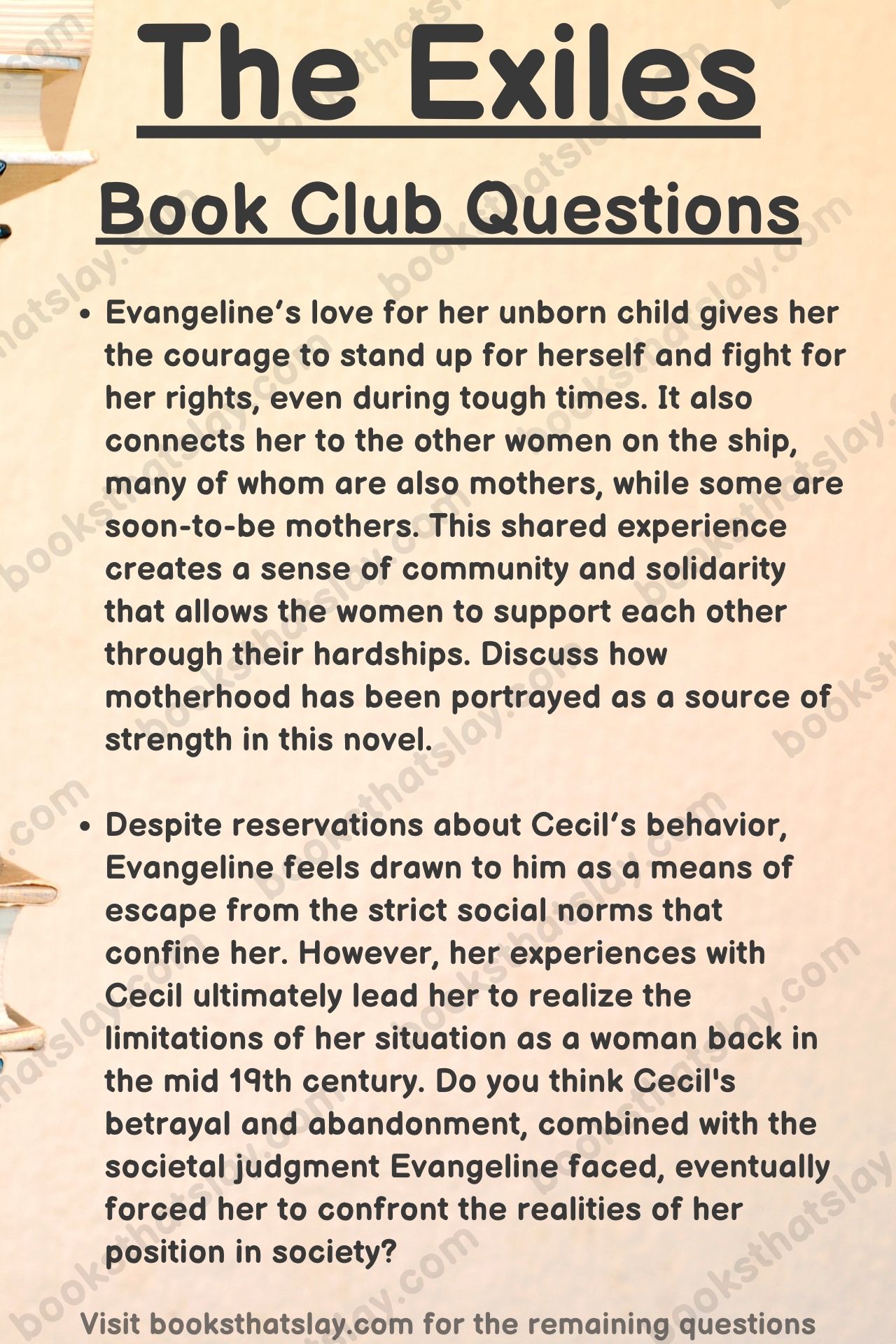10 The Exiles Book Club Questions
Embark on a harrowing journey to 19th-century Australia with Christina Baker Kline’s The Exiles.
This powerful novel introduces us to three extraordinary women whose lives intersect amidst the harsh realities of a penal colony.
Evangeline, a disgraced governess, Hazel, a cunning thief, and Mathinna, a young Aboriginal girl, find themselves bound together by circumstance as they navigate the unforgiving landscape of a new world.
Join us as we delve into the depths of their stories, exploring themes of survival, friendship, and the enduring power of the human spirit. Our discussion guide offers thought-provoking questions that will ignite conversations about the complexities of colonization, the resilience of women, and the search for redemption.

The Exiles Book Club Questions
- Mathinna is forcibly removed from her family by the Franklins, who wield their power and privilege as members of the British ruling class. Evangeline, a woman in a position of low social status, is accused of a crime she did not commit and is punished severely, while Cecil, a member of the British aristocracy, faces no repercussions for his actions. Hazel, as a female convict, is marginalized and treated as a disposable liability by the colonial authorities.
Discuss how Christina Baker Kline addressed issues of power and privilege (particularly in the context of colonialism and gender) in the novel.
- Doctor Dunne is a respected physician, but he faces skepticism and mistrust from the wider community, who view his unorthodox methods with suspicion. Evangeline, as a governess, is knowledgeable about science and medicine but is dismissed and belittled by her employers when she tries to share her knowledge. Hazel, as a midwife, is ostracized by society because of her profession, even though her skills save lives.
Based on their professions, explain how the novel has depicted the relationship between science and society and how do characters navigate the tensions between these worlds?
- Evangeline’s social status initially contributes to her naive and sheltered personality, as she is used to the privileges and expectations of the upper class. However, as she is forced to confront the harsh realities of life as a convict, she begins to shed her preconceptions and develop a more complex understanding of the world around her.
What’s your take on this character development of Evangeline?
- While Evangeline is educated and refined, Hazel is street-smart and practical. Evangeline is initially naive and sheltered, while Hazel has had to navigate difficult circumstances and adapt to survive.
What are some other uncommon things about Evangeline and Hazel you feel everyone should lay their eyes upon after reading the novel?
- Despite reservations about Cecil’s behavior, Evangeline feels drawn to him as a means of escape from the strict social norms that confine her. However, her experiences with Cecil ultimately lead her to realize the limitations of her situation as a woman back in the mid 19th century.
Do you think Cecil’s betrayal and abandonment, combined with the societal judgment Evangeline faced, eventually forced her to confront the realities of her position in society?
- Evangeline’s love for her unborn child gives her the courage to stand up for herself and fight for her rights, even during tough times. It also connects her to the other women on the ship, many of whom are also mothers, while some are soon-to-be mothers. This shared experience creates a sense of community and solidarity that allows the women to support each other through their hardships.
Discuss how motherhood has been portrayed as a source of strength in this novel.
- Ruby Dunne is able to assert herself and make her own choices, unlike many of the women in the novel. She decides to travel to London to confront her biological father and reclaim her mother’s legacy. Additionally, she feels a connection to the Aborigine culture, as evidenced by her interest in the shell necklaces and her desire to learn more about her biological mother’s life.
Don’t you think Ruby Dunne represents the face of a future woman in the upcoming years – one who decides to move past the rules and create her own identity?
- Mathinna’s forced assimilation shows how the British Empire sought to erase the Aborigine people’s identity and culture by taking Mathinna away from her home and forcing her to conform to British customs. They were attempting to make her forget her heritage and become what they call “civilized.” She is ultimately abandoned by the Franklins and left with nowhere to go, which represents the ways in which colonizers often left the people they displaced without resources or support.
Discuss the forced effects of colonization based on this context.
- Doctor Caleb Dunne’s character arc highlights the theme of overcoming prejudice and learning to work together for the common good. Initially, Dunne is dismissive of Hazel’s healing methods because they do not align with his traditional medical training. However, as he spends more time with her and sees the positive results of her methods, he becomes more open-minded and ended up with the will to work with her.
Don’t you think this growth demonstrates that even those who may initially hold prejudice can overcome it with empathy and understanding?
- The characters in the novel are nuanced but unique, with each carrying a specific type of lesson to learn from them.
How does Kline utilize her characters to examine the effects of colonialism on indigenous populations and explore themes of power, privilege, and oppression in the context of historical policies?
If you liked this set of questions, here are a few other options for you to explore: